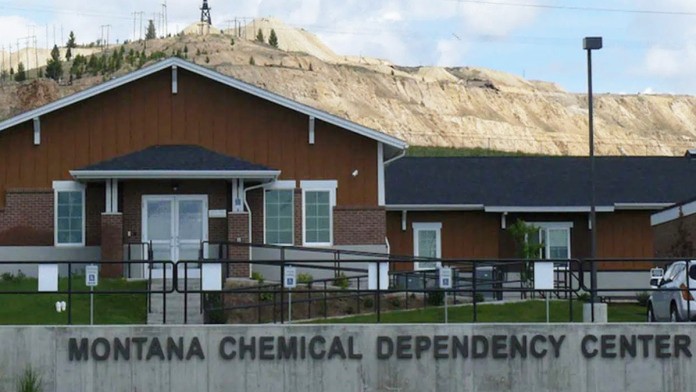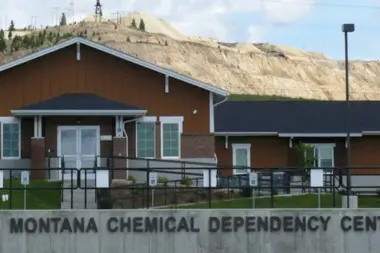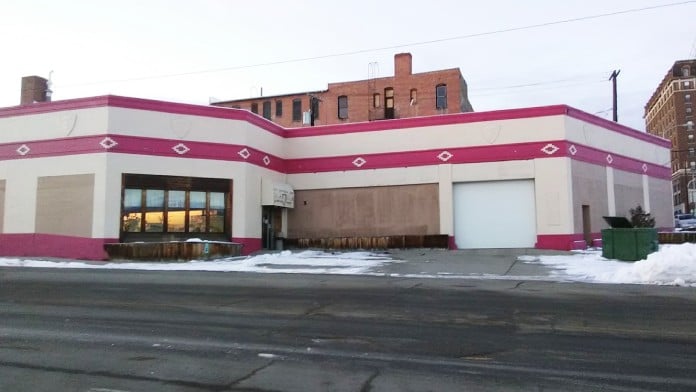I was there for a while and everybody here help me a lot if you want to change your life you have to come here. Great place.
About Montana Chemical Dependency Center
Montana Chemical Dependency Center (MCDC) is an inpatient substance use recovery facility operated by the Montana state government. They also handle individuals with co-occurring mental health issues. They’re situated on East Mercury Street in uptown Butte near the historic district and downtown area within Silver Bow County. The facility comprises 16 treatment beds for men and women each as well as 16 beds for withdrawal management or inpatient detox.
The broader area boasts a fully equipped recreational space including a workout/exercise room, outdoor basketball and volleyball court and horseshoe pits. They’re tobacco-free and you’ll be treated with respect and dignity as you work on your struggle with addiction. They’re also very affordable. They accept Medicaid and let the uninsured pay based on their ability. They do not accept walk-in patients. You must be referred by a licensed addiction counselor and follow the established application procedure to be accepted.
Individualized Support for Lasting Healing
Substance use recovery at MCDC adopts a tailored approach to achieve the best recovery outcomes. You’ll undergo assessment during intake and work with your care providers to create a tailored recovery plan. This typically begins with supervised withdrawal management for most people. This procedure lets you detox under the care of expert clinicians who provide 24/7 monitoring to ensure a safe and comfortable withdrawal.
Peer Support and Extended Services
You’ll enjoy the support of peer specialists who’ll guide you through your recovery journey. You’ll also participate in self-help meetings like AA/NA to build strong support networks.
Outdoor/indoor recreational activities are important components of the program so that you can have fun in recovery. Individuals with co-occurring conditions receive adequate psychiatric support as part of integrated care.
Random urinalysis is routinely conducted to monitor progress and compliance with treatment guidelines. Treatment can last up to 35 days or more. You may receive support with finding a job, accommodation or planning the next step in your healing journey via case management.
Facility Overview
Latest Reviews
Rehab Score
Gallery


Other Forms of Payment
Private insurance refers to any kind of healthcare coverage that isn't from the state or federal government. This includes individual and family plans offered by an employer or purchased from the Insurance Marketplace. Every plan will have different requirements and out of pocket costs so be sure to get the full details before you start treatment.
Self-pay involves paying for treatment out of your own pocket. You can use savings or credit, get a personal loan, or receive help from family and friends to fund your treatment. If you don't have insurance or your insurance plan doesn't cover a specific program, self-pay can help ensure you still get the care you need.
Financial aid can take many forms. Centers may have grants or scholarships available to clients who meet eligibility requirements. Programs that receive SAMHSA grants may have financial aid available for those who need treatment as well. Grants and scholarships can help you pai for treatment without having to repay.
Sliding scale payments are based on a client's income and family size. The goal is to make treatment affordable to everyone. By taking these factors into account, addiction recovery care providers help ensure that your treatment does not become a financial burden to you or your family, eliminating one barrier to care.
Medicare is a federal program that provides health insurance for those 65 and older. It also serves people under 65 with chronic and disabling health challenges. To use Medicare for addiction treatment you need to find a program that accepts Medicare and is in network with your plan. Out of pocket costs and preauthorization requirements vary, so always check with your provider.
Medicaid is a state based program that helps lower-income individuals and families pay for healthcare. Medicaid covers addiction treatment so those enrolled can use their coverage to pay for rehab. When a program accepts Medicaid the client often pays very little or nothing out of their own pocket.
Military members, veterans, and eligible dependents have access to specific insurance programs that help them get the care they need. TRICARE and VA insurance can help you access low cost or no cost addiction and mental health treatment. Programs that accept military insurance often have targeted treatment focused on the unique challenges military members, veterans, and their families face.
Addiction Treatments
Levels of Care
Clients enrolled in outpatient rehab typically reside in their own homes and many continue to work and/or attend school while receiving addiction treatment. The frequency and intensity of outpatient treatment varies based upon the clients' evolving needs. Many programs offer a full continuum of outpatient care, including partial hospitalization (PHP), intensive outpatient (IOP), sober living/halfway housing, and standard outpatient services. The most common treatment modalities are psychotherapy, life skills training, and medication assisted treatment (MAT).
Residential treatment programs are those that offer housing and meals in addition to substance abuse treatment. Rehab facilities that offer residential treatment allow patients to focus solely on recovery, in an environment totally separate from their lives. Some rehab centers specialize in short-term residential treatment (a few days to a week or two), while others solely provide treatment on a long-term basis (several weeks to months). Some offer both, and tailor treatment to the patient's individual requirements.
Clients who still need robust recovery care, but also need to remain in or return to their own homes may choose to enroll in an intensive outpatient program (IOP). These programs feature frequent, high-level treatment, often combining a variety of modalities, including addiction counseling, recovery education, and holistic therapies. Clients in alcohol and/or opioid recovery may also receive medication assisted treatment (MAT). Most intensive outpatient rehabs require clients to participate in nine to 20 hours of treatment weekly.
Clients participating in a rehab aftercare program have typically already completed detox and/or intensive inpatient treatment and are reintegrating into their home, workplace, and community. Rehab aftercare services generally include outpatient counseling, recovery education, holistic care, and medication assisted treatment (MAT). Many clients also continue to receive recovery support after being discharged from outpatient treatment. Case managers and care teams help clients access the services they need at each phase of the recovery journey.
12-step programs are addiction recovery models based on Alcoholics Anonymous (AA). A number of substance abuse programs (including some drug and alcohol rehab centers) use the 12 steps as a basis for treatment. Beginning steps involve admitting powerlessness over the addiction and creating a spiritual basis for recovery. Middle steps including making direct amends to those who've been hurt by the addiction, and the final step is to assist others in addiction recovery in the same way. 12-Step offshoots including Narcotics Anonymous (NA), Cocaine Anonymous (CA), Dual Recovery Anonymous (DRA), Sex and Love Addicts Anonymous (SLAA) and Gamblers Anonymous (GA).
Each sober living home in Montana maintains strict rules that residents must follow. This structured environment is designed to provide a safe place of support and accountability for residents to establish and maintain sobriety. To remain in the halfway house, residents must pay their own rent, which varies by location. Some homes include utilities and other services, which can make sober living homes quite affordable.
A successful drug intervention in Montana requires careful collaboration between family members and intervention services. An intervention specialist helps the individual understand how their substance abuse is affecting themselves and others and understand how treatment can help. This professional may be certified as an interventionist or possess other mental health qualifications. They walk everyone through the intervention step by step, then provide follow-up services for treatment.
Drug and alcohol addiction often takes a heavy toll on one's body. Over time, a physical dependence can develop, meaning the body physiologically needs the substance to function. Detox is the process of removing drugs and/or alcohol from the body, a process that can be lethal if mismanaged. Medical detox is done by licensed medical professionals who monitor vital signs and keep you safe, healthy, and as comfortable as possible as you go through detox and withdrawal.
Treatments
The goal of treatment for alcoholism is abstinence. Those with poor social support, poor motivation, or psychiatric disorders tend to relapse within a few years of treatment. For these people, success is measured by longer periods of abstinence, reduced use of alcohol, better health, and improved social functioning. Recovery and Maintenance are usually based on 12 step programs and AA meetings.
A comprehensive drug rehab in Montana treats the entire person. Treatment methods address all the underlying causes of addiction and give the individual the tools they need to live a healthy, drug-free life.
Many of those suffering from addiction also suffer from mental or emotional illnesses like schizophrenia, bipolar disorder, depression, or anxiety disorders. Rehab and other substance abuse facilities treating those with a dual diagnosis or co-occurring disorder administer psychiatric treatment to address the person's mental health issue in addition to drug and alcohol rehabilitation.
Opioid rehabs specialize in supporting those recovering from opioid addiction. They treat those suffering from addiction to illegal opioids like heroin, as well as prescription drugs like oxycodone. These centers typically combine both physical as well as mental and emotional support to help stop addiction. Physical support often includes medical detox and subsequent medical support (including medication), and mental support includes in-depth therapy to address the underlying causes of addiction.
Substance rehabs focus on helping individuals recover from substance abuse, including alcohol and drug addiction (both illegal and prescription drugs). They often include the opportunity to engage in both individual as well as group therapy.
Programs
Adult rehab programs include therapies tailored to each client's specific needs, goals, and recovery progress. They are tailored to the specific challenges adult clients may face, including family and work pressures and commitments. From inpatient and residential treatment to various levels of outpatient services, there are many options available. Some facilities also help adults work through co-occurring conditions, like anxiety, that can accompany addiction.
Young adulthood can be an exciting, yet difficult, time of transition. Individuals in their late teens to mid-20s face unique stressors related to school, jobs, families, and social circles, which can lead to a rise in substance use. Rehab centers with dedicated young adult programs will include activities and amenities that cater to this age group, with an emphasis on specialized counseling, peer socialization, and ongoing aftercare.
Serving in the military is both mentally and physically challenging, and can result in trauma that persists even after combat ends. Military programs are tailored to the specific and often complex needs of active duty personnel, veterans, and military families. Clients often access these programs through the U.S. Department of Veterans Affairs (VA).
Clinical Services
During cognitive behavioral therapy in Montana, patients learn to be their own therapists. They develop coping skills so they can change their thinking and behavior in day to day life. This helps them overcome mental and substance use disorders.
Your rehab program in Montana may include dialectical behavior therapy (DBT). This method helps you understand your feelings, accept them, and learn to manage them. With the skills you develop, you'll be able to make positive changes. Sessions include both individual and group settings.
Group therapy is any therapeutic work that happens in a group (not one-on-one). There are a number of different group therapy modalities, including support groups, experiential therapy, psycho-education, and more. Group therapy involves treatment as well as processing interaction between group members.
In individual therapy, a patient meets one-on-one with a trained psychologist or counselor. Therapy is a pivotal part of effective substance abuse treatment, as it often covers root causes of addiction, including challenges faced by the patient in their social, family, and work/school life.
The role of the counselor who applies motivational interviewing is to listen and reflect rather than offer advice or warnings. By expressing the client's own thoughts back to them, the therapist allows the client to reflect on their motivations and come to their own conclusions about their need for change.
Trauma therapy helps you process traumatic events that you may have witnessed or experienced. This is the first step to healing from these events, integrating them into a more coherent narrative, and improving your resilience.
Family therapy offers a platform for open and honest dialogue about the challenges that addiction has created within the family unit. Using guided sessions, your therapist helps family members develop healthy communication skills and address unresolved issues. By working together, families can help support their loved one's sobriety.
It's possible to quit smoking without using nicotine replacement therapy. However, research has shown these tools can greatly increase your chances of success. They can make it easier to quit because they ease withdrawal symptoms and cravings.
Amenities
-
Gym
-
Yoga Studio
-
Residential Setting
-
Private Rooms
-
Hiking
-
Mountain Views
Accreditations

State Licenses are permits issued by government agencies that allow rehab organizations to conduct business legally within a certain geographical area. Typically, the kind of program a rehab facility offers, along with its physical location, determines which licenses are required to operate legally.
State License: Montana
Contact Information
525 East Mercury Street
Butte MT, 59701
